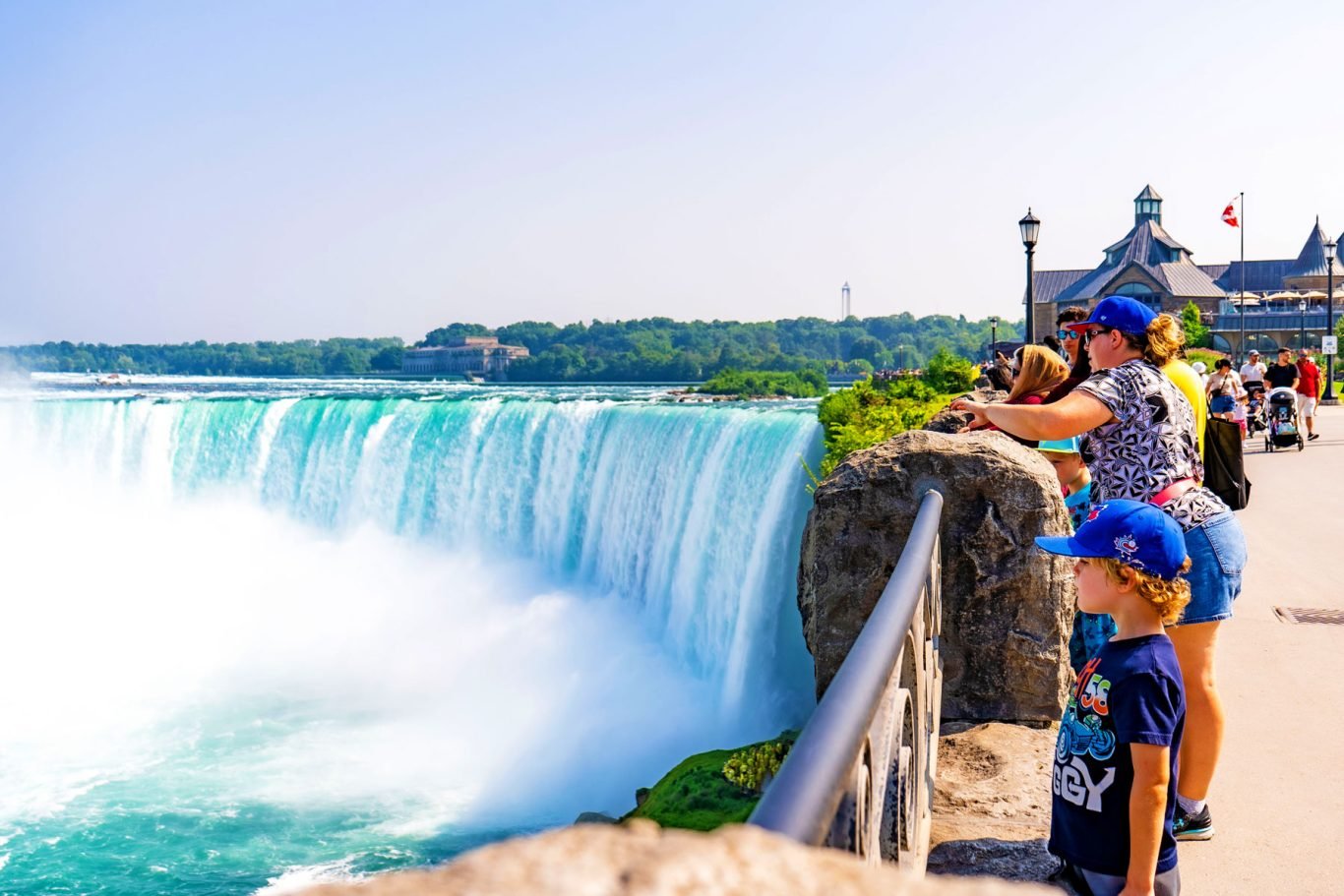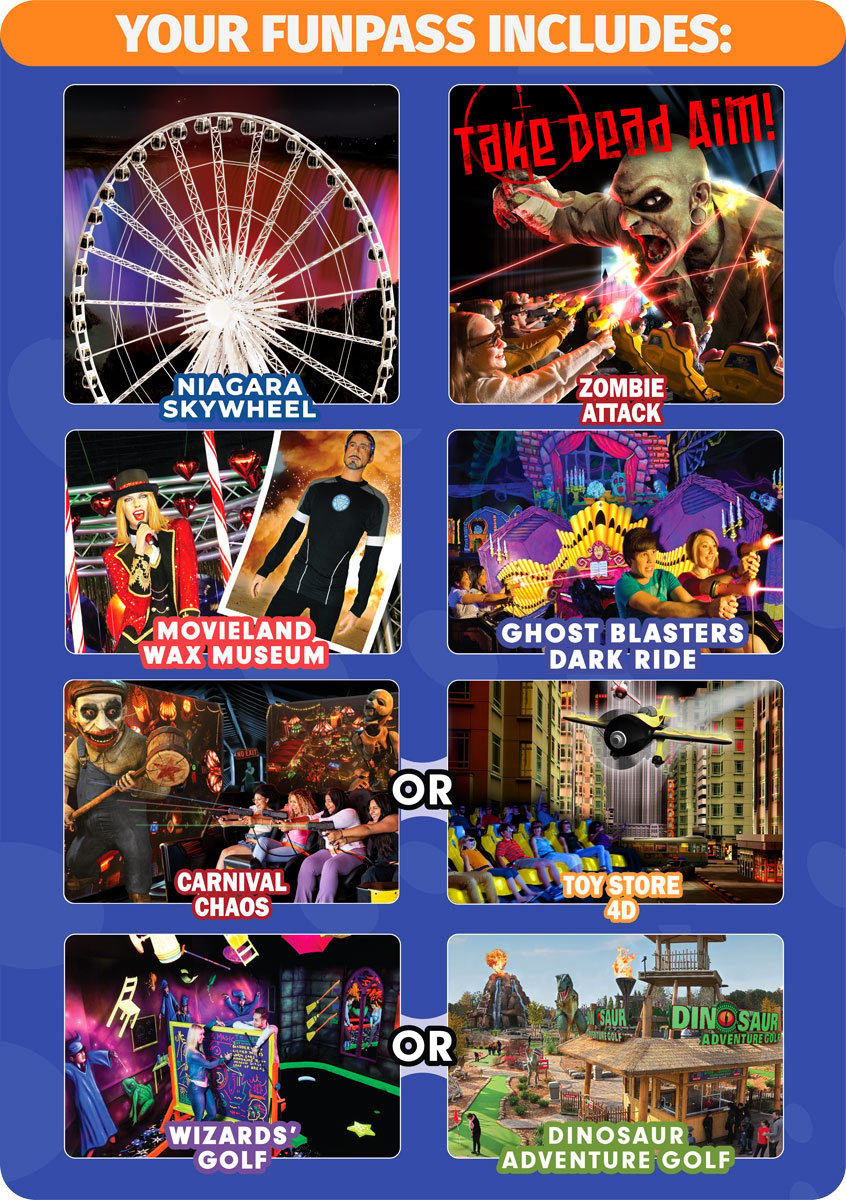Planning a budget-friendly family trip to Niagara Falls? You’ll be delighted to discover that the region offers an abundance of completely free attractions that provide unforgettable experiences for visitors of all ages. From the thunderous majesty of the waterfalls themselves to serene botanical gardens and fascinating historical sites, there’s no shortage of activities that won’t cost you a dime. This comprehensive guide highlights the very best free attractions in the area, complete with detailed descriptions, insider tips, and practical information to help you plan the perfect family outing. Whether you’re visiting for a day or staying longer, these destinations promise to create lasting memories without straining your wallet.
Experiencing the Majesty of Niagara Falls
No visit to the region would be complete without experiencing the awe-inspiring power of Niagara Falls. The Canadian side offers the most spectacular panoramic views of Horseshoe Falls, where you can feel the mist on your face from observation decks along the Niagara Parkway. On the American side, you’ll get an equally impressive but different perspective, with viewing platforms that bring you remarkably close to Bridal Veil Falls.

Both sides offer completely free access to these natural wonders, with well-maintained walking paths, picnic areas, and plenty of spots to pause and take in the breathtaking scenery. At night, the falls transform into a dazzling light show, with colorful illuminations that change throughout the evening.
Tips for Families:
- Early morning visits (before 10am) mean fewer crowds and better photo opportunities
- Pack waterproof jackets or ponchos – the mist from the falls can be substantial
- Check the Niagara Parks website for special illumination schedules and fireworks displays
- Consider visiting in winter when the frozen falls create a magical icy spectacle
Location Details:
Canadian Falls (Horseshoe Falls): 6650 Niagara Pkwy, Niagara Falls, ON
American Falls: 5920 Niagara Pkwy, Niagara Falls, ON
Exploring Niagara Glen Nature Reserve
For families who love outdoor adventures, the Niagara Glen Nature Centre offers one of the most spectacular natural experiences in the region. This 200-acre nature reserve features a network of hiking trails that wind through a pristine Carolinian forest and descend into the dramatic Niagara Gorge. The trails range from easy walks to more challenging routes with stone staircases leading down to the river’s edge. Along the way, you’ll encounter fascinating geological formations, including massive boulders and ancient rock strata that tell the story of the falls’ formation over thousands of years. The center itself provides educational displays about the area’s unique ecosystem and geology, making it both a fun and informative outing.
Tips for Families:
- Wear sturdy hiking shoes with good traction – some trails can be steep and slippery
- Bring plenty of water and snacks as there are no concessions in the park
- The easier upper trails are perfect for young children or strollers
- Visit in autumn when the fall foliage creates a breathtaking colorful display
Location Details:
Niagara Glen Nature Centre
3050 Niagara Pkwy, Niagara Falls, ON L2E

Discovering Niagara Botanical Gardens
Spanning nearly 100 acres along the Niagara Parkway, the Niagara Botanical Gardens is a horticultural wonderland that showcases an incredible variety of plant life. The gardens feature meticulously maintained themed areas including a spectacular rose garden with over 2,400 plants, a fragrant herb garden, a tranquil Japanese garden, and expansive collections of perennials, annuals, and woody plants. Walking paths meander through the different sections, allowing visitors to enjoy the beauty at their own pace. The gardens serve as the outdoor classroom for the Niagara Parks School of Horticulture, so you’ll often see students tending to the plants and can sometimes chat with them about their work. With its peaceful atmosphere and stunning floral displays, it’s the perfect place for a relaxing family stroll.
Tips for Families:
- Peak bloom times vary by season – June for roses, July for perennials
- Bring a picnic to enjoy at one of the many scenic benches
- Combine your visit with the nearby Butterfly Conservatory (small admission fee)
- Don’t miss the arboretum with its impressive collection of trees
Location Details:
Niagara Botanical Gardens
2565 Niagara Pkwy, Niagara Falls, ON L2E 2S7

Marveling at the Floral Clock
One of Niagara’s most photographed attractions, the Floral Clock is a remarkable feat of horticultural engineering. This functioning clock features a face planted with more than 20,000 colorful carpet bedding plants that are changed twice yearly to create stunning seasonal designs. The clock mechanism itself is housed in a stone structure built from Queenston limestone, with the minute hand stretching an impressive 4.3 meters in length. Visitors can walk around the entire clock to appreciate the intricate planting patterns up close, and there’s an informative plaque explaining the clock’s history and operation. The surrounding gardens are equally beautiful, making this a perfect spot for family photos.
Tips for Families:
- The best viewing is from May through October when the floral displays are at their peak
- Arrive on the hour to hear the clock chime
- Combine your visit with nearby attractions like the Laura Secord Homestead
- Morning light provides the best conditions for photography
Location Details:
Floral Clock
14004 Niagara Pkwy, Queenston, ON L0S 1L0
Enjoying Queen Victoria Park
Situated right at the brink of Horseshoe Falls, Queen Victoria Park offers what are arguably the most spectacular views of Niagara Falls. This beautifully landscaped park features expansive lawns, colorful flower beds, and strategically placed benches that allow visitors to sit and marvel at the natural wonder before them. The park’s design incorporates both formal garden elements and naturalistic plantings, with many specimens labeled for those interested in horticulture. At night, the park becomes the best vantage point for viewing the illuminated falls, with special lighting effects that change throughout the evening. Throughout the summer months, the park often hosts free concerts and cultural events on its open-air stage.
Tips for Families:
- The park gets crowded midday – visit early or late for more space
- Bring a blanket for picnicking on the lush lawns
- Winter visits offer stunning views of the frozen falls
- Check the schedule for free summer concerts and events
Location Details:
Queen Victoria Park
6345 Niagara Pkwy, Niagara Falls, ON L2E 6X8
Niagara Falls Illumination
Falls Illumination Schedule
| JANUARY 1 – JANUARY 31 | 5 PM – 1 AM | ||||||||
| FEBRUARY 1 – MARCH 11 | 5:30 PM – 1 AM | ||||||||
| MARCH 12 – MARCH 31 | 7:30 PM – 2 AM | ||||||||
| APRIL 1- MAY 14 | 8:00 PM – 2 AM | ||||||||
| MAY 15 – JULY 31 | 8:30 PM – 2 AM | ||||||||
| AUGUST 1 – AUGUST 15 | 8:00 PM – 2 AM | ||||||||
| AUGUST 16 – AUGUST 31 | 7:30 PM – 2 AM | ||||||||
| SEPTEMBER 1 – 19 | 7:00 PM – 2 AM | ||||||||
| SEPTEMBER 20 – 30 | 6:30 PM – 2 AM | ||||||||
| OCTOBER 1 – 15 | 6:15 PM – 2 AM | ||||||||
| OCTOBER 16 – OCTOBER 31 | 6:00 PM – 2 AM | ||||||||
| NOVEMBER 1 – DECEMBER 31 | 4:30 PM – 2 AM | ||||||||
Tips for Families:
- Check the official schedule for exact illumination times which vary by season
- Fireworks typically begin at 10pm in summer months
- Arrive 30 minutes early to secure the best viewing spots
- Combine with an evening stroll along the Niagara Parkway
Location Details:
Niagara Falls Illumination Viewing Area
6345 Niagara Parkway, Niagara Falls, ON L2E 6X8
Dufferin Islands
This hidden gem located just downstream from the main falls offers a completely different Niagara experience. The Dufferin Islands are a cluster of small, interconnected islands featuring peaceful walking trails, charming wooden bridges, and abundant wildlife. The area is particularly known for its birdwatching opportunities, with numerous species making their home in the protected natural environment. During the winter months, the islands transform into the Winter Festival of Lights display, with thousands of twinkling lights creating a magical atmosphere. The calm waters around the islands are perfect for gentle paddling in summer, and there are several picnic areas where families can relax and enjoy the serene surroundings.
Tips for Families:
- Bring birdseed to feed the friendly ducks and geese
- Perfect spot for young children to safely explore nature
- Visit at dusk in winter for the spectacular light displays
- Pack a picnic to enjoy by the water’s edge
Location Details:
Dufferin Islands
6345 Dufferin Isle Rd, Niagara Falls, ON L0S 1A0
Niagara Falls History Museum
This engaging museum offers fascinating insights into the history of Niagara Falls, from its geological formation to its development as a tourist destination. The museum’s collection includes artifacts from the War of 1812, exhibits on daredevils who attempted to conquer the falls, and displays about the area’s industrial heritage. Interactive elements make it particularly appealing for children, including opportunities to try on period costumes, handle replica artifacts, and test their balance on a simulated tightrope walk. The museum offers free admission on Thursday evenings, making it an excellent budget-friendly activity. Special temporary exhibitions rotate throughout the year, so there’s always something new to discover.
Tips for Families:
- Free admission on Thursdays from 5-9pm makes for a great evening activity
- Allow at least 1-2 hours to fully explore the exhibits
- Check the museum’s website for special family programming
- Combine your visit with nearby attractions like the Niagara Falls Art Gallery
Location Details:
Niagara Falls History Museum
5810 Ferry St, Niagara Falls, ON L2G 1S9 [View on Google Maps
Kingsbridge Park
This expansive riverside park in Chippawa offers one of Niagara’s best free recreational areas. Features include a large shaded playground, wading pool, picnic pavilions, and direct access to the Niagara River Recreational Trail. The park’s location at the confluence of the Welland and Niagara Rivers makes it historically significant as a former commercial hub. Today, families enjoy fishing from shore (license required), birdwatching (great blue herons are common), and swimming in designated areas (strong swimmers only due to currents). The park’s mature trees provide ample shade, making it ideal for summer visits.
Tips for Families:
- Parking is free on weekdays, small fee weekends
- Excellent spot for watching freighters enter the Welland Canal
- Bring binoculars for birdwatching
- Historical markers explain the area’s significance
Location Details:
Kingsbridge Park
7870 Niagara Pkwy, Niagara Falls, ON L0S 1J0
Oakes Garden Theatre
This stunning formal garden serves as a grand entrance to Queen Victoria Park from Clifton Hill. Designed in 1937 in the Italianate style, the theatre features symmetrical flower beds, elegant stone staircases, decorative iron gates, and a beautiful curved pergola offering panoramic views of both American and Horseshoe Falls. The garden’s design incorporates native Queenston limestone and carefully curated plantings that change with the seasons. What makes it particularly special is how it seamlessly blends manicured gardens with the natural beauty of the falls, creating perfect photo opportunities at every turn. Free concerts and performances sometimes take place in the natural amphitheater during summer months.
Tips for Families:
- Visit in late spring when the tulips are in full bloom
- The pergola provides excellent shade on hot summer days
- Perfect spot for family photos with the falls as backdrop
- Combine with a visit to nearby Queen Victoria Park
Location Details:
Oakes Garden Theatre
5825 River Rd, Niagara Falls, ON L2G 3K9
Heartland Forest
This 200-acre nature sanctuary offers families a wonderful opportunity to connect with nature through its accessible trails and unique features. The highlight is undoubtedly Canada’s largest accessible treehouse, connected to the ground by a 210-foot ramp that allows visitors of all abilities to experience the thrill of being high in the treetops. Other attractions include a turtle pond, frog habitat, and several kilometers of walking trails that wind through Carolinian forest. The forest is particularly committed to accessibility, with wheelchair-friendly paths and sensory experiences designed for visitors with special needs. Educational signage throughout the property helps children learn about local flora and fauna while they explore.
Tips for Families:
- The treehouse is a must-visit – allow time for kids to explore
- Bring binoculars for birdwatching along the trails
- Visit in different seasons to see how the forest changes
- Check their website for special nature programs and events
Location Details:
Heartland Forest
8215 Heartland Forest Rd, Niagara Falls, ON L2H 0L5
Niagara Parkway Biking
Often called “the prettiest Sunday drive in the world” by Winston Churchill, the Niagara Parkway offers an incredible 35-mile cycling route along the Niagara River from Fort Erie to Niagara-on-the-Lake. The completely paved, mostly flat trail is ideal for family biking with numerous scenic stops along the way. Highlights include the Floral Clock, Queenston Heights Park, and numerous historic sites. Bike rentals are available throughout Niagara Falls if you don’t bring your own, including child trailers and tandem options. The trail is well-marked with rest areas, water stations, and plenty of spots to pause and enjoy river views.
Tips for Families:
- Start early to avoid afternoon heat in summer months
- The section from Niagara Falls to Niagara-on-the-Lake is most scenic
- Pack swimsuits – there are several beach access points
- Consider electric bike rentals for less strenuous riding
Location Details:
Niagara Parkway Trail Access Points:
Southern Start: 350 Lakeshore Rd, Fort Erie
Northern Start: 51 Queen’s Parade, Niagara-on-the-Lake
Outdoor Splash Pads
Niagara Falls operates several free outdoor pools and splash pads during the summer months, offering families refreshing ways to cool off. These facilities are supervised by certified lifeguards and feature various water play structures, making them perfect for kids of all ages.
FREE Public Pools:
- F.H. Leslie Pool (5250 Valley Way)
- Opens June 8 | 1-7pm daily | Closes Sept 1
- Lessons 10am-12pm | Adult lane swim 12-1pm ($)
- Buck Hinsperger Pool (3970 Welland St)
- Opens June 27 | 1-6pm daily | Closes Aug 24
- Lions Pool (4981 Drummond Rd)
- Opens June 27 | Weekdays 1-5pm, Weekends 1-6pm | Closes Aug 24
- Lessons 5-7pm
- Prince Charles Pool (6320 Arad St)
- Opens June 27 | 1-7pm daily | Closes Aug 30
- Certification courses 9am-1pm
FREE Splash Pads (10am-7:30pm daily):
- 7 locations including Chippawa Lions Park, E.E. Mitchelson Park, and MacBain Centre
Key Info:
- All public swim FREE in 2025
- Safety wristbands required for kids
- Indoor swimming at MacBain until outdoor pools open
Tips for Families:
- Best Time to Visit: Weekday mornings (less crowded)
- What to Bring: Swimsuits, sunscreen, water shoes, towels
- Facilities: Most locations have washrooms and shaded seating
- Safety: Lifeguards supervise pools, but parents should always watch children
For the most up-to-date schedules and possible closures, check the Niagara Falls City Pools & Splash Pads Page before visiting.
Happy Rolph’s Animal Farm
This charming petting zoo and park offers families a delightful rural experience just minutes from the city. The farm features a variety of friendly animals that children can interact with, including goats, sheep, rabbits, and chickens. Beyond the animal encounters, the park boasts beautiful walking trails, two picturesque ponds, and access to Lake Ontario’s shoreline. The playground area is particularly well-designed, with equipment suitable for different age groups. The park’s relaxed atmosphere makes it ideal for a full day of outdoor fun, and the shaded picnic areas provide perfect spots for family meals. Best of all, admission is completely free, though donations are appreciated to help maintain the facility.
Tips for Families:
- Bring quarters to purchase feed for the animals
- Pack a lunch to enjoy at the scenic picnic areas
- Combine your visit with nearby Port Dalhousie’s beach and pier
- Early mornings are best for seeing active animals
Location Details:
Happy Rolph’s Animal Farm
650 Read Rd, St. Catharines, ON L2R 7K6
Welland Canal
The Welland Canal is an engineering marvel that allows ships to bypass Niagara Falls, and the Lock 3 viewing complex provides a front-row seat to this impressive operation. From the free observation deck, visitors can watch massive freighters and lakers (some over 700 feet long) rise and fall as they navigate the lock system. The process is fascinating to observe, with the water level changing by up to 46 feet in just minutes. Informative plaques explain the canal’s history and operation, making it an educational experience as well as an entertaining one. The nearby museum (small admission fee) offers additional exhibits about the canal’s importance to regional commerce and transportation.
Tips for Families:
- Check the ship schedule online to time your visit with lock operations
- Bring binoculars for close-up views of the massive ships
- The nearby playground makes this a great stop for kids
- Summer weekends often feature special events and demonstrations
Location Details:
Welland Canal Centre
1932 Welland Canals Pkwy, St. Catharines, ON L2R 7K6
Morningstar Mill & Museum
Step back in time at this beautifully preserved 19th-century grist mill located near DeCew Falls. The mill still operates today, grinding grain using water power just as it did when it was built in 1872. Visitors can tour the mill and learn about the milling process from knowledgeable guides, then explore the adjacent Morningstar family home which has been restored to its early 20th-century appearance. The surrounding property features lovely walking trails that lead to picturesque DeCew Falls, making this a perfect combination of history and nature. Special milling demonstrations are held on weekends during the operating season, offering a fascinating look at traditional technology.
Tips for Families:
- Visit on weekends between May and October for milling demonstrations
- The trails to DeCew Falls are moderately challenging but rewarding
- Pack a picnic to enjoy by the mill pond
- Combine with a visit to nearby Lake Moodie
Location Details:
Morningstar Mill
2714 Decew Rd, St. Catharines, ON
Walk Clifton Hill: The World Famous Street of Fun by the Falls
While many of Clifton Hill’s attractions require paid admission, simply exploring this vibrant entertainment district is an experience in itself. Known as “the Street of Fun,” Clifton Hill dazzles visitors with its neon lights, oversized attractions, and carnival-like atmosphere. Kids will love spotting the life-sized dinosaur at the dinosaur mini-golf course, the giant Frankenstein statue, and the moving figures in the haunted house facades. Street performers often entertain crowds, and the smell of freshly made fudge and cotton candy fills the air. Even if you don’t enter any paid attractions, there’s plenty to see and do just by walking up and down the street and taking in the lively atmosphere.
Tips for Families:
- Evening visits offer the most vibrant light displays
- Stop by fudge shops for free samples
- Weekday mornings are least crowded
- The hill is steep – consider this if pushing strollers
Location Details:
Clifton Hill
4960 Clifton Hill, Niagara Falls, ON L2G 3N4
Save $30 Off Clifton Hill Attractions
Welcome to Clifton Hill, where the fun never stops! Are you ready to make the most of your visit without breaking the bank? We’ve got you covered with our Clifton Hill Fun Pass – your ticket to saving big on all the exciting attractions this vibrant street has to offer.
While strolling along the “Street of Fun by the Falls” is always free and filled with delightful sights and sounds, we know you’re eager to dive into the action. That’s where the Fun Pass comes in handy! It’s the ultimate way to get more bang for your buck and enjoy all the attractions without worrying about overspending. So, let’s make the most of your Clifton Hill adventure together!
Final Tips for Your Niagara Visit
To make the most of your budget-friendly Niagara adventure, keep these additional tips in mind:
Best Times to Visit:
- Spring and fall offer pleasant weather with smaller crowds
- Weekdays are generally less busy than weekends
- Early mornings provide the best experience at popular spots like the falls
Money-Saving Strategies:
- Pack lunches and snacks to avoid expensive tourist-area restaurants
- Take advantage of free parking at some attractions (like Happy Rolph’s)
- Use public transit where possible – kids 12 and under ride free on GO Transit
What to Bring:
- Comfortable walking shoes for exploring
- Layers of clothing – temperatures can vary near the water
- Reusable water bottles to stay hydrated
- Camera or smartphone for capturing memories
Special Considerations:
- Many attractions are wheelchair accessible, but check individual websites for details
- Some free attractions accept donations to help with maintenance
- Combination visits (like Botanical Gardens + Floral Clock) maximize your time
Niagara Falls and its surrounding region offer countless opportunities for memorable family experiences that don’t require expensive tickets or passes. By focusing on these wonderful free attractions, you can create an amazing vacation that delights children and adults alike while keeping your budget intact. Whether you’re marveling at natural wonders, exploring historical sites, or simply enjoying beautiful outdoor spaces, Niagara’s free attractions prove that the best things in life – and travel – don’t have to cost a fortune.


